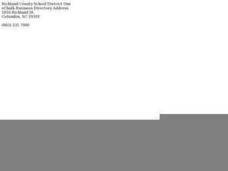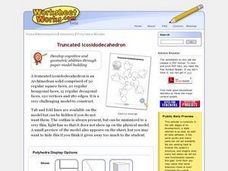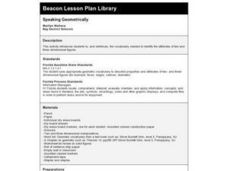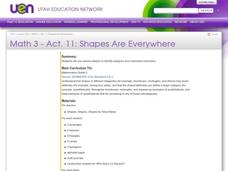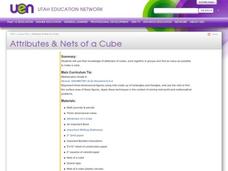Curated OER
Surface Area of Rectagular Prisms
Sixth graders investigate the area of polygons. In this geometry lesson, 6th graders calculate area of prisms using geometric formulas. They work with prisms and other rectangular shapes.
Curated OER
Truncated Icosidodecahedron
In this math worksheet, students use a paper model to build a truncated icosidodecahedron. The worksheet includes a model that is to be cut out and put together by the student. There is an option to include a small preview of the...
Curated OER
Truncated Icosahedron
In this math worksheet, students build a model of a truncated icosahedron. This shape has 12 regular pentagonal faces and 20 regular hexagonal faces. An option to include a preview of the finished model is included for the teacher.
Curated OER
Dodecahedron
In this dodecahedron worksheet, learners build a model of a dodecahedron. The pattern for this shape is made up of twelve pentagons. This is a worksheet generator, and the teacher can choose if a sample of the completed shape will be...
Curated OER
Surface Area and Volume
In this geometry worksheet, 10th graders determine the lateral area, surface area, and volume of pyramids and prisms. The one page worksheet contains five problems. Answers are not included.
Curated OER
Cut It Out!
Students calculate the surface area of polygons. In this geometry lesson, students use spacial reasoning to find the answer to their problem. They analyze solids and create formulas to estimate the measurements of the area.
Curated OER
Nature's Polyhedrons
Students discover the characteristics of polyhedra. Through hands-on activities and interactive videos, students investigate and retrieve information on polyhedra and crystal structures. Students study angles and symmetry. They...
Curated OER
Effect on Surface Area and Volume
Students identify the effect the change of dimensions causes for the volume and surface area. In this geometry instructional activity, students compare perimeter, area and volume as they play around with the dimensions of the polygons....
Curated OER
Speaking Geometrically
Fourth graders are introduced to the vocabulary needed to identify the attributes of two and three-dimensional figures. They work together to create a word wall, which contains the geometric terminology being learned.
Curated OER
Identify Cones
Third graders evaluate the attributes of cones. In this space shapes lesson, 3rd graders analyze three-dimensional shapes. Students explore the faces and edges of a cone.
Curated OER
The X-33 and the X-38
Students explore the relationships among the lengths, areas, and volumes of similar solids. They also discover what effect doubling the dimensions of a figure has on the resulting area.
Curated OER
Polygons
Fourth graders identify and describe lines, shapes, and solids using formal geometric language. They use Inspiration to create a graphic organizer and outline of polygons.
Curated OER
Shapes are Everywhere
Second graders gain an understanding of geometric shapes and spatial reasoning. They learn the attributes of solid shapes in everyday activities. Students compare geometric shapes to everday objects, finding things that serve a purpose...
Curated OER
How Many Regular Polyhedrons Are There In This or Any Universe?
Students examine the idea of "regularity" as it pertains to geometry. For this geometry lesson students complete several assignments that are part of trihedral angles and regular polyhedrons.
Curated OER
Space Shapes
Students read "Captain Invincible and the Space Shapes" by Stuart Murphy and view a PowerPoint presentation on shapes. They identify shapes presented in the book and then identify shapes found in their classroom.
Curated OER
NUMB3RS Activity: Regular Ploygon Centroids
Young scholars investigate geo-profiling. In this secondary mathematics lesson plan, students use geo-profiling to determine the most probable location of a criminal. Young scholars find the centroid of a polygon where the vertices...
Curated OER
Volume and Surface Area
Students explore volume and surface area. In this math lesson, students fill boxes with cubes to identify the volume of the boxes. Students discuss area.
Curated OER
Volume of a Cylinder
Middle and high schoolers calculate the volume of cylinders. They measure the height, radius and diameter of cylinders. Following given formulas, students calculate the area and volume of the cylinder. They compare cylinders and predict...
Curated OER
Shapes Are Everywhere
Third graders use various shapes to identify polygons and understand symmetry. They explore pattern blocks noticing their similarities and differences, then share with other team members. They draw 3 polygons in their journals and...
Curated OER
Attributes & Nets of a Cube
Third graders engage in a lesson that focuses on the attributes and forming of a cube. They construct a cube using different combinations while comparing a square with only two-dimensions. Students fold paper while following the...
Shodor Education Foundation
Sets and the Venn Diagram (Beginner)
Venn diagrams are helpful in understanding the idea of a set and using attributes to sort items. This basic plan is an introduction with an added bonus of an applet that can be used to demonstrate the activity. If a classroom of...
Shodor Education Foundation
Pythagorean Theorem
Most adults remember learning about the Pythagorean theorem, but they don't all remember how to use it. The emphasis here is on developing an intuitive understanding of how and when to use the theorem. Young mathematicians explore...
Old Dominion University
Introduction to Calculus
This heady calculus text covers the subjects of differential and integral calculus with rigorous detail, culminating in a chapter of physics and engineering applications. A particular emphasis on classic proof meshes with modern graphs,...
Curated OER
Pythagorean Theorem
For this measurement lesson, learners examine the Pythagorean Theorem, perimeter, and areas of right triangles. They record their measurements and research their findings on a grid.


